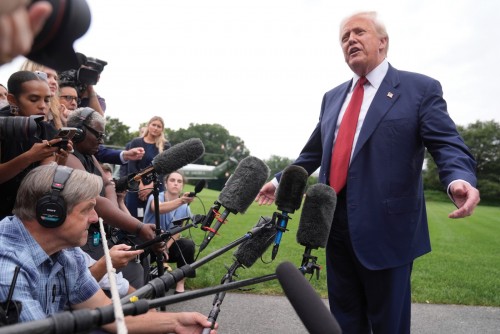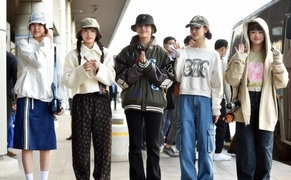 |
| U.S. President Donald Trump speaks to reporters before boarding Marine One at the White House en route to New Jersey on August 1. When asked about the summit with South Korea, he said, "We have a great relationship with South Korea." / Source: AP-Yonhap |
President Lee Jae-myung and U.S. President Donald Trump are expected to hold their first summit later this month, with "modernizing the Korea-U.S. alliance" set to dominate the agenda. Unlike the recently concluded tariff negotiations that centered on economic issues, the upcoming meeting will likely focus on security topics, including adjustments to U.S. Forces Korea, increased defense spending, and U.S. arms purchases.
According to diplomatic sources on August 3, the two governments are finalizing details for a summit in the U.S., anticipated between mid- and late August. Trump previously indicated that the summit would be held within two weeks following the conclusion of the tariff talks. When asked about the timing on August 1, Trump said, "We have a great relationship with South Korea."
For Seoul, a key objective is redefining the alliance established in 1953 to address broader international challenges beyond North Korea, such as defense cost-sharing and troop realignment.
The U.S. is pressing allies, including the EU, to commit to increased defense spending and purchases of American arms and energy. Although Korea signed the 12th Special Measures Agreement (SMA) last October, concerns remain that Washington may seek renegotiation or push for Seoul to cover costs related to deploying U.S. strategic assets, as it did during Trump’s first term in 2019.
Washington is also urging Seoul to raise its defense spending to 5% of GDP, up from the current 2.32%, which would nearly double Korea’s defense budget from 61.2 trillion won to about 132 trillion won.
Additionally, amid heightened U.S.-China rivalry, the role of U.S. forces in Korea could be revised. Following a recent foreign ministers’ meeting, the U.S. State Department emphasized that "peace and stability in the Taiwan Strait are essential to the security and prosperity of the international community," hinting at greater coordination on China. Seoul, however, has so far framed its stance around maintaining "peace and stability in the Indo-Pacific," avoiding direct reference to cross-strait tensions.
Most Read
-
1
-
2
-
3
-
4
-
5
-
6
-
7





















